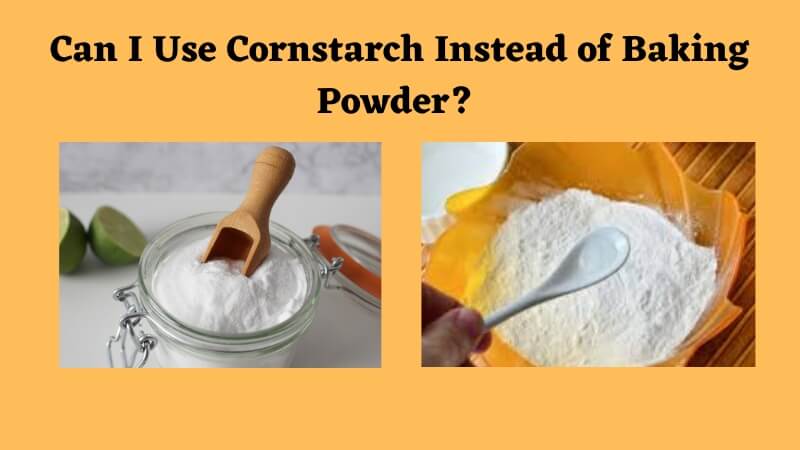You can not use cornstarch instead of baking powder. They are different regarding usability and can not be a substitute for each other. But there are other substitutes for a baking powder that you may find helpful.
This article will help you to learn about cornstarch and baking powder. This will also show you how they are made, why you can not use cornstarch instead of baking powder, and many more.
Are Baking Powder and Cornstarch the Same Thing?
No, baking powder and cornstarch are not the same things. Baking powder is a type of leavening agent that is commonly used in baking. It is made up of a combination of baking soda, acid, and cornstarch.
When the powder is wetted, the acid and the baking soda react, producing carbon dioxide gas bubbles that cause the dough or batter to rise. This makes the cake, muffins, and other baked goods light and fluffy.
Cornstarch, on the other hand, is a thickening agent. It is made from the endosperm of the corn kernel and is a fine, white powder. Cornstarch is often used to thicken sauces, soups, and other liquid-based foods.
Cornstarch is made by grinding the endosperm portion of corn kernels and is often used as an alternative to flour when making sources.
While both baking powder and cornstarch are often used in cooking and baking, they differ from each other a lot.
Can I Use Cornstarch Instead of Baking Powder?
No, you can not use cornstarch instead of baking powder. The use of cornstarch in place of baking powder is not recommended.
Why People Get Confused Between Baking Powder and Cornstarch
- They may not have baking powder nearby but have cornstarch.
- Cornstarch is seemingly identical to baking powder.
- Cornstarch also has a similar texture and appearance to baking powder.
- They both are used in baking recipes.
Why You SHOULD NOT Use Cornstarch Instead of Baking Powder
- Baking powder is a leavening agent that helps baked goods rise, while cornstarch is a thickening agent used to give a silky texture to sauces and gravies.
- Baking powder contains an acid and a base, which create carbon dioxide bubbles when moistened and heated. This process helps baked goods rise, creating a light and fluffy texture.
The acid and base are absent when substituting cornstarch for baking powder. This may lead to an unpleasant texture to the menu you are baking. Also, the fluffy texture may not come with cornstarch instead of baking powder. - Baking powder is composed of a combination of baking soda, an acidifying agent, and a drying agent, while cornstarch is a corn-based product with a powdery texture.
As baking powder and cornstarch have significant differences, the following comparison table will help you to differentiate them quickly.
Key Differences Between Cornstarch and Baking Powder
| Key Points | Cornstarch | Baking Powder |
| Origin | Extracted from the endosperm of the corn kernel and grinding. | Formed by the reaction between powdered acid and sodium bicarbonate. |
| Chemical Reaction | Intensify the thickening reaction when added with heat and starch molecules. Additionally, cornstarch can be used for additional thickening when mixed with any liquid. | A delicious dessert is created when added to baked goods. Air bubbles can be formed with it. |
| Average Cost | $0.18 – $0.30 per ounce | $0.25 – $0.40 per ounce |
| Appearance | Powdery, white, velvety | White, powdery |
Can I Make Baking Powder Using Cornstarch?
Yes, you can make a homemade baking powder using cornstarch. This is an excellent option for those looking more natural than store-bought baking powder.
To make the baking powder, you’ll need one baking soda and two cornstarch. Cornstarch can be an adequate substitute for baking powder as it helps to leaven the ingredients in a recipe.
While you’ll get a lighter texture from baking powder, the texture of your baked goods when using cornstarch is still satisfactory.
Also, homemade baking powder with cornstarch will last up to six months in an airtight container in a cool, dry place.
Alternatives That Can Replace Baking Powder
Instead of looking at cornstarch for baking powder replacement, you can find some actual replacements for baking powder. Here are some of the alternatives to baking powder –
- Baking Soda – An excellent substitute for baking powder. It can be used alone or with other ingredients like cream or tartar. But under normal conditions, baking soda is not a suitable replacement for baking powder.
If baking soda is not mixed up with the recipe containing acid, that recipe will produce a metallic flavor. - Yogurt – Yogurt is another option that can be used to lighten the texture of baked goods and add moisture. You need to use half a cup of yogurt and a quarter teaspoon of baking soda the replacement each teaspoon of baking powder.
As yogurt has acidic properties, it can be a great addition to baking soda to make the cake fluffy, moist, and edible. - Buttermilk – Buttermilk is another ingredient that serves a dual purpose, adding moisture and lightening the texture of the baked product. Adding baking soda can produce tons of fluffiness and moisturizing.
- Vinegar – Vinegar (Ethanoic Acid) is another alternative that can be used with baking soda to add air and lightness to recipes. As vinegar is a lightly acidic solution, baking soda will make the best use of it to make cakes, bread, etc.
Frequently Asked Questions
Does Cornstarch or Baking Powder Make Foods Crispy?
Whether cornstarch or baking powder makes foods crispy depends on the type of food being cooked. For instance, for fried foods, using cornstarch can create a crispy exterior that is golden brown.
On the other hand, baking powder is a leavening agent that makes foods light and fluffy. It produces carbon dioxide bubbles in doughs and batters. When exposed to heat, these bubbles expand and cause the food to rise.
What Happens If I Accidentally Use Cornstarch Instead of Baking Powder?
If you accidentally use cornstarch instead of baking powder, the result will likely be a dense and gummy texture since cornstarch lacks the leavening properties that baking powder provides.
Cornstarch is often used for thickening sauces and gravies, which is why it’s not suitable for baking. The same can be said for flour, which should never be used as a substitute for baking powder.
To avoid this problem, it’s important to read the recipe carefully and make sure you have the right ingredients before beginning your baking project.
Final Words
While cornstarch and baking powder both help baking recipes become light and fluffy, they are not interchangeable ingredients. But there are a lot of other alternatives to baking powder that you can try to make your cake light, fluffy, and moist too.
Baking powder can be used as a substitute for cornstarch in a pinch. But to mimic the thickening power of cornstarch, use a combination of flour and butter or an egg white. Knowing when to use which ingredient will help you create the perfect baked goods.


